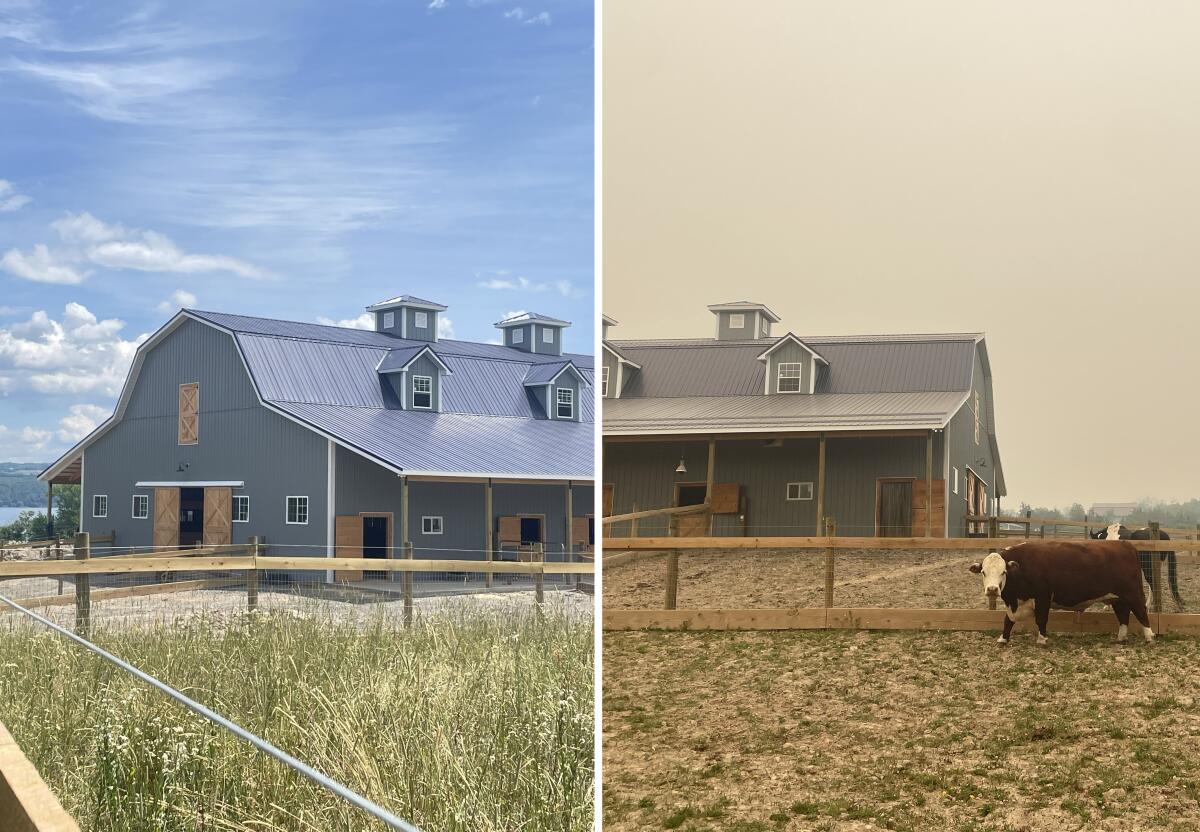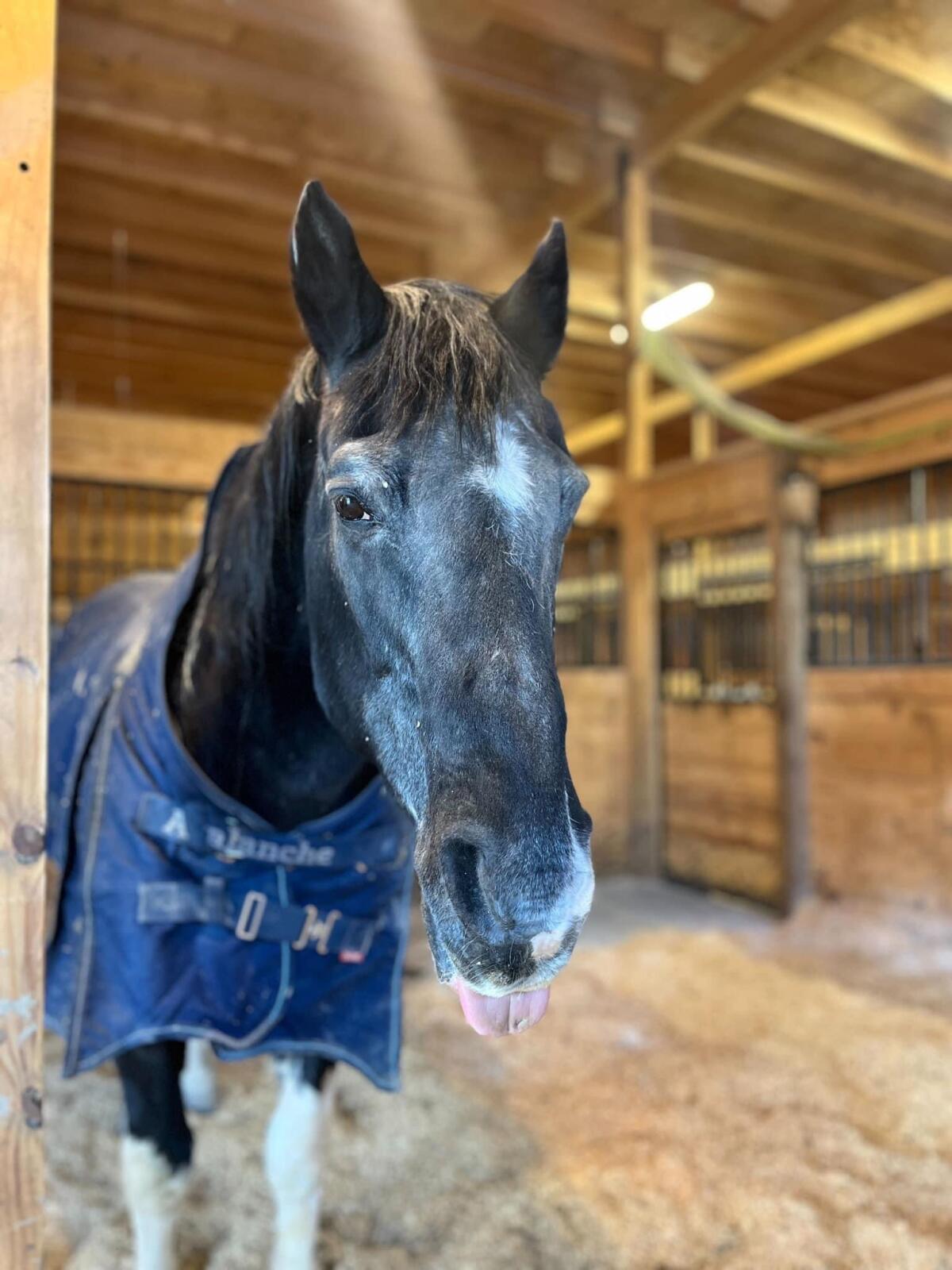Wildfires forced this animal sanctuary out of California. But smoke found them in their new home too

- Share via
WASHINGTON — Last year, Nate Salpeter and his wife, Anna Sweet, moved their animal sanctuary from California to western New York in the hopes of dodging the regular wildfires that had threatened their safety and the health of the creatures in their care.
But this week, Salpeter once again smelled smoke. Massive wildfires burning in Canada were sending huge plumes of ash across the U.S., forcing air quality warnings, baseball game cancellations and school closures up and down the East Coast.
For Salpeter, Sweet and the team at Sweet Farm Foundation, their new animal sanctuary on the west shores of Seneca Lake in Himrod, N.Y., the problem was all too familiar.
“You can barely see across the lake yesterday, and Anna said ‘I thought we left this behind,’” Salpeter said. “There’s a little bit of PTSD involved from that whole experience.”
For much of Thursday, the air quality in Himrod was classified as “unhealthy” by the U.S. Air Quality Index.
Salpeter and Sweet founded Sweet Farm in Half Moon Bay in Northern California in 2015. But in August 2020, the sanctuary was threatened by the CZU Lightning Complex fire, which ravaged San Mateo and Santa Cruz counties. In just four hours, a team of about 45 workers and community volunteers evacuated more than 140 animals, including cows, pigs, ducks, goats and a 37-year old stallion called Sturgis, to two other sanctuaries out of the raging fire’s path.

The fire, which destroyed 1,500 properties and consumed 86,000 acres, ultimately spared the farm, but the sanctuary’s team found the experience difficult, nonetheless. “Just going through that experience was extremely traumatic, it was stressful for the animals, for the team, and everyone involved,” Salpeter told The Times on Thursday.
That close call was a catalyst. After years of wildfires, droughts and other extreme climate conditions, Salpeter and Sweet decided to relocate the animal sanctuary to Himrod, a town in western New York that they determined to be “climate stable” and also close to Sweet’s hometown, Penn Yan.
“If it wasn’t that [CZU fire] that actually burned down the farm or caused catastrophe, when would the next one happen and would that be the one that actually burns it down?” Salpeter said. “We wanted to [move] on our own terms, before it was an eleventh-hour emergency.”
Climate change has influenced other Californians’ migration decisions. Stanford University’s Nina Berlin Rubin and Gabrielle Wong-Parodi found in a recent study of 1,100 California residents that “experiencing negative outcomes during the 2020 wildfire season was associated with an increased likelihood of intending to migrate.” About a third of respondents intended to move in the next five years, and nearly a quarter of those likely to move reported that wildfire and smoke influenced their decision at least a moderate amount.
In May 2022, after months of planning, paperwork and animal blood tests, the Sweet Farm team loaded the cows, sheep, geese, pigs, llamas and chickens — and the aging Sturgis — onto two 18-wheeler trucks to make the 47-hour, nearly 3,000-mile journey to Himrod.
A year later, Salpeter says he and Sweet have no regrets. The lake provides them easy access to fresh water, and the region has a wine industry, which is a reminder of their former home. They are no longer under the near-constant threat of wildfires and other extreme climate events.
But this week’s harsh conditions have also provided a reminder.
“No one is immune, no one is completely unaffected by climate change, no matter where you’re located,” Salpeter said.
More to Read
Get the L.A. Times Politics newsletter
Deeply reported insights into legislation, politics and policy from Sacramento, Washington and beyond. In your inbox twice per week.
You may occasionally receive promotional content from the Los Angeles Times.











